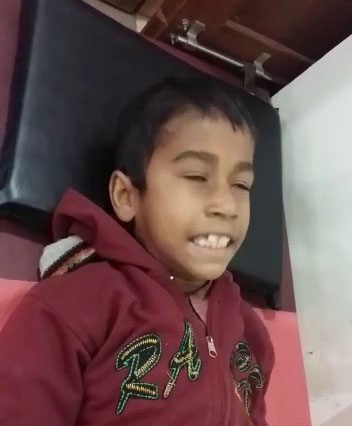|
|
|
Indian Pediatr 2017;54: 878 |
 |
Psychogenic Sneezing
|
|
*Betsy Mathew, Ramesh Neelannavar
and #Marulasiddappa
PM
Department of Pediatrics, BLDE University’s,
Shri BM Patil Medical College Hospital & Research Centre, and #Department of
Psychiatry, Civil Hospital; Vijayapur, Karnataka, India.
Email:
[email protected]
|
|
A 10-year-old boy with no personal or family history
of allergic disorders presented with intractable sneezing of 5 days. The
sneezing used to be continuous except during sleep and while talking (Fig.
1,Web Video 1). Physical examination and local
examination of the nose was normal. Nasal decongestants and oral
antihistamines were tried without any benefit. On detailed psychological
evaluation, it was found that the child wanted to join an English-medium
school as advised by his school teacher, but could not do so because of
financial constraint of parents. The child and parents were counseled
regarding the nature of symptoms and perpetuating factors. He was
prescribed tablet Alprazolam 0.25 mg twice a day for a week. The
frequency of sneezing episodes reduced over a week, and the episodes
subsided in a month.
 |
|
Fig.1 Child during sneezing episode (see video link).
|
Psychogenic sneezing occurs between 9 and 15 years of
age, and is characterized by: (i) occurrence in adolescent
females, (ii) asymptomatic while asleep, (iii) eyes will
be open while sneezing, (iv) no response to a wide variety of
medications but subsides with psychotherapy, (v) has an "aborted"
or "pseudosneeze" pattern (absence of inspiratory phase with lack of
aerosolization of nasal secretions and associated short nasal grunting),
(vi) physical examination and investigations are normal,
Significant psychiatric history may not be evident. The differential
diagnosis are allergic rhinitis, foreign body in the nose and vasomotor
rhinitis. It is important to recognize this entity so as to avoid
unnecessary investigations and treatment; psycho-therapy remains the
treatment of choice.
|
|
|
 |
|

